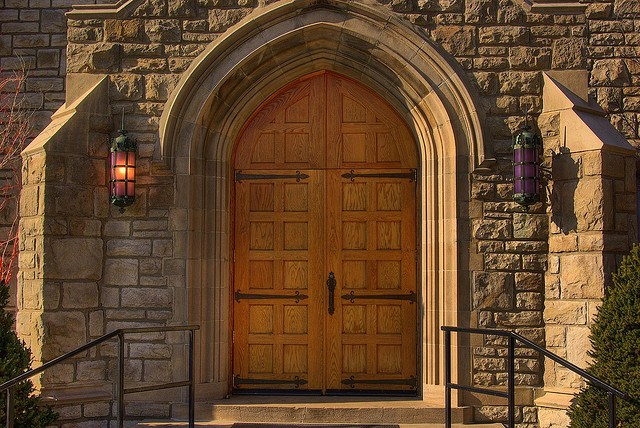What is this — the Middle Ages? A Toronto church has given sanctuary to a Hungarian Roma family who came here as refugees. They were rejected on a virtual technicality and the Harper government wants them deported. They’ve lived at the church for two years. Before that they spent a year with Catholic monks. It’s not a cathedral, and Quasimodo didn’t swoop out of the bell tower to scoop them up. It’s on a leafy street. They don’t want it named in case the feds decide to rush it or hatemeisters target it.
When I drove up the other day, Timea Daróczi was smoking outside. It’s the closest she gets to taking a walk. Her husband Jozsef Pusuma and six-year-old daughter Lulu have taken over the minister’s study. The congregation, who prayed a lot before diving in, raised enough to put in a bathroom. Their fridge is in the men’s choir room. The barber and dentist come when needed. It’s all good, everyone says. I think good is the operative term.
How did it come to this? People wonder how religion-based groups like the Muslim Brotherhood became prominent in the Arab world, where secular-nationalist regimes like Nasser’s Egypt were once the norm. But gradually those authoritarian governments narrowed the range of social programs, diverted resources to military and security, and repressed opposition. Only the mosques were too deeply rooted to effectively contain. So they responded to needs like poverty or education and became sites where opposition was voiced — sanctuaries in a way, for better and worse. Of course we’re not the same; but stifled social or political impulses will seek expression — sometimes via religion.
Our current government has reduced basic services (like Chretien-Martin before it). In the case of refugee claimants, they’ve restricted access to health care and are doing the same to welfare. They’ve applied pressure to the screening process and been “incredibly effective,” says Toronto Life, with “Hungarian claimants declining by 97 per cent.” The numbers seeking asylum here from everywhere have reached a “historic low.” Jason Kenney visited Hungary and said, pretty clearly, that Roma refugees aren’t wanted (Toronto Life again). Current minister Chris Alexander won’t budge on the brutal procedures. Compassionate considerations need not apply. He gets this year’s Peter Kent award for pitiless pandering when he should know better.
You can say: wait for an election and vote these guys out. But by then Jozsef and Timea may be gone. They’ve had a ton of positive media. None of it got them beyond the church property, much less to a McDonalds up the street, which Lulu longs for. That’s why the churches act. They can do no other. It’s in their DNA, at least some of them. It’s also in their scriptures, or some of those.
This brings us to the role of religion in this affair. Is sanctuary an act of religion, or politics, ethics, or something else? I’m happy to call it religious, on the assumption that religion can penetrate almost any aspect of life. Back in the days of Quasimodo, the church was sometimes the source of opposition to political power, when it wasn’t trying to exercise that power itself.
Same thing with ISIS. I’m not with those who say it’s a perversion of Islam, I think it’s a version of Islam, though a highly perverse one. The noble journalist-scholar Rami Khouri was here Wednesday and said ISIS is an outfit of misfits. If they weren’t in Syria they’d be with some cult on a mountaintop. Theologian Richard Niebuhr had the final word on this conundrum. He said religion makes good people better and bad people worse. Cases in point: sanctuary and ISIS.
Some words are just too broad and flexible to use seriously. Religion is one; terrorism, another. Harper and the RCMP insist last week’s shootings were terrorism. Tom Mulcair took the bait and said they weren’t, possibly alienating voters inclined to see every traffic jam in Ottawa now as terror related. Justin Trudeau was more, Yah, whatever. He saved his powder for the real battles, which will be over how many more rights can be jettisoned and oppositional voices shut down — like the refugee process and the rights that used to attend it.
This column was first published in the Toronto Star.
Photo: Brandon Payne/flickr



